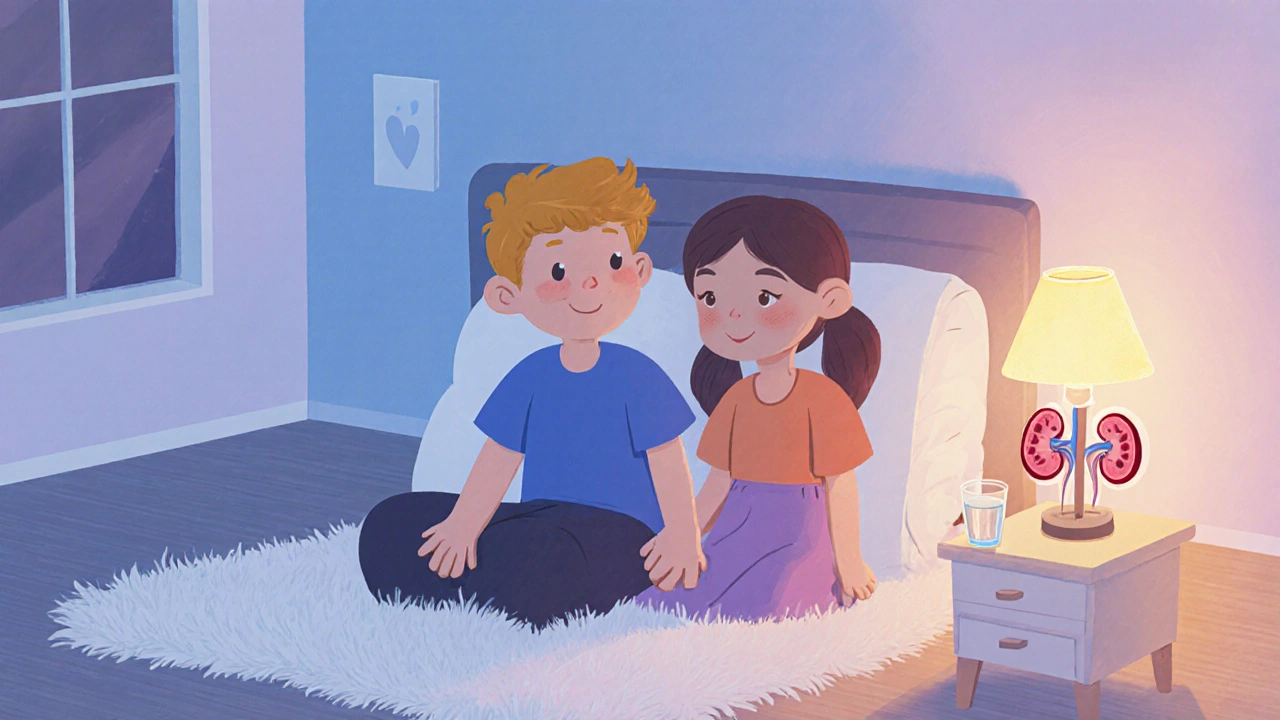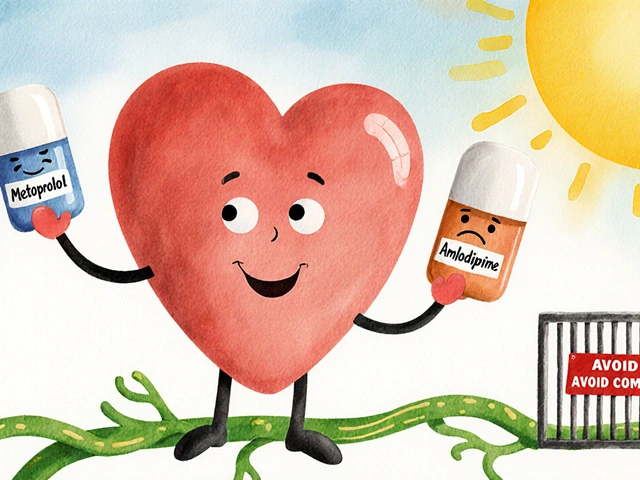Renal Failure Sexual Health Impact Calculator
This tool helps you understand how your kidney disease and treatments may be affecting your intimate relationship. Based on your responses, you'll receive personalized recommendations from the article.
Your Personalized Assessment
Based on your responses, here are recommendations for maintaining intimacy:
Living with Renal failure is a daily juggling act-diet, medication, appointments, and the constant worry about what the next lab result will bring. Add a romantic relationship into the mix, and the challenge feels even bigger. Many couples wonder if the disease will drain the spark, but the good news is that intimacy isn’t dead after a kidney diagnosis. With the right knowledge and a few practical tweaks, you can protect the emotional bond and keep the bedroom happy.
renal failure sexual health is a topic that rarely shows up in clinic notes, yet it’s a top concern for patients and partners alike. This guide breaks down why kidney problems affect desire, what treatment side‑effects look like, and concrete strategies to stay close.
Understanding Renal Failure and Its Impact on Sexual Health
Sexual health is the state of physical, emotional, mental, and social well‑being related to sexuality. When the kidneys can’t filter waste, toxins build up, hormones go haywire, and energy levels plunge-all of which can dim the desire to be close.
Renal failure, also called chronic kidney disease (CKD), progresses through five stages based on glomerular filtration rate (GFR). Even early stages can cause subtle shifts in hormone balance; later stages magnify fatigue, anemia, and fluid overload, making intimacy feel like a marathon instead of a sprint.
Hormonal and Physical Changes
- Hormone imbalance: The kidneys help convert vitamin D and regulate sex hormones. In CKD, testosterone drops in men and estrogen can become erratic in women, leading to reduced libido.
- Anemia and fatigue: Low red‑blood‑cell counts mean less oxygen for muscles, so getting out of bed for a night of cuddling can feel exhausting.
- Blood pressure meds: Drugs like beta‑blockers and ACE inhibitors can cause erectile dysfunction (ED) in men and decreased vaginal lubrication in women.
- Dry skin and itching: Uremic toxins trigger pruritus, making skin feel uncomfortable and discouraging touch.
- Fluid restriction: Having to limit water intake can leave the mouth dry, reducing kiss‑quality and overall comfort.
All these factors intertwine. For example, low testosterone combined with anemia can amplify fatigue, creating a vicious cycle that erodes both desire and performance.
Medication and Treatment Side Effects
Depending on the treatment stage, patients may be on dialysis, awaiting a kidney transplant, or living post‑transplant. Each scenario brings its own set of sexual side‑effects.
| Stage | Typical Issue | Why It Happens |
|---|---|---|
| Pre‑dialysis (CKD Stage 3‑4) | Reduced libido, mild ED | Hormone shift, anemia, early meds |
| Dialysis (in‑center or home) | Severe fatigue, body image concerns, ED | Fluid shifts, low blood pressure during sessions, scar tissue |
| Post‑transplant | Medication‑induced libido changes, occasional ED | Immunosuppressants (steroids) affect hormones, stress about graft survival |
Knowing the root cause makes it easier to address the symptom. For instance, if a beta‑blocker is the culprit for ED, a doctor may switch to an alternative that spares sexual function.
Emotional & Body Image Challenges
Living with a chronic illness often reshapes self‑confidence. The presence of a fistula for hemodialysis, surgical scars from a transplant, or sudden weight fluctuations can make the body feel alien.
Feelings of anxiety or depression are common. A study from the Australian Kidney Care Network (2023) found that 38% of CKD patients reported moderate to severe anxiety, and 22% reported depressive symptoms. When the mind is clouded, desire wanes.
Partners can either become a source of reassurance or, unintentionally, a reminder of the disease. Open dialogue is the cornerstone of breaking that loop.
Practical Strategies to Keep Intimacy Alive
- Talk early and often: Schedule a calm, non‑medical conversation about each other's needs. Use “I” statements - “I feel tired after dialysis, can we try a shorter cuddle session?”
- Plan around treatment: Know when dialysis sessions start and finish. Schedule intimate moments for after a session when fluid is balanced and blood pressure is stable.
- Adjust positioning: If a fistula is in the arm, avoid pressure on that side. Try side‑lying or seated positions that keep the access site comfortable.
- Use lubricants: Dry mouth or vaginal dryness can be mitigated with water‑based lubricants. They’re safe with condoms and don’t interfere with medications.
- Address ED directly: Prescription options (PDE5 inhibitors) work for many on dialysis, but always discuss with a nephrologist to avoid blood‑pressure interactions.
- Mind‑body techniques: Simple breathing exercises, short meditation, or a warm shower together can lower stress hormones and boost arousal.
- Seek professional help: A sexual therapist who understands CKD can provide tailored exercises and counseling.
Remember, intimacy isn’t limited to sex. Holding hands, sharing a favorite TV show, or cooking a renal‑friendly meal together all reinforce the bond.

Role of Healthcare Professionals
Nephrologists, dietitians, and nurses can all contribute. Ask your care team:
- “Can my blood‑pressure medication be changed to improve sexual function?”
- “What nutritional tweaks can help boost energy for intimacy?”
- “Are there support groups for couples dealing with kidney disease?”
Many hospitals now have a renal‑psychology liaison who can screen for anxiety, depression, and relationship strain.
Checklist for Couples
- Schedule a weekly “relationship check‑in” without medical talk.
- Keep a symptom diary (fatigue level, medication side‑effects) to spot patterns.
- Discuss medication changes with the doctor before making assumptions.
- Explore non‑penetrative intimacy options when energy is low.
- Plan a fun, non‑medical activity at least once a month.
Ticking these boxes builds routine, reduces uncertainty, and keeps the emotional connection strong.
Frequently Asked Questions
Can dialysis cause erectile dysfunction?
Yes. The combination of low blood pressure during sessions, medication side‑effects, and reduced testosterone can lead to ED. Discussing alternatives with a nephrologist often helps.
Is it safe to use lubricants during dialysis?
Water‑based lubricants are safe and won’t affect the dialysis machine or access site. Avoid oil‑based products if you’re using latex condoms.
Will a kidney transplant improve my sex drive?
Many patients report a boost in energy and libido after a successful transplant, but immunosuppressants like steroids can still affect hormones. Follow‑up with your doctor for fine‑tuning.
How can I talk to my partner without sounding like I’m blaming the disease?
Use “I feel” statements and focus on solutions. Example: “I feel drained after my night dialysis; can we try a short movie night before we get intimate?”
Are there support groups for couples dealing with CKD?
Yes. Many renal clinics run peer‑support circles, and national organizations like Kidney Health Australia host online forums specifically for partners.
Intimacy after a renal failure diagnosis isn’t a myth-it just needs a little extra care. By understanding the body changes, making strategic lifestyle tweaks, and keeping the conversation flowing, couples can preserve the closeness that makes life worth living.





9 Comments
Tammy Sinz
Understanding the endocrine disruption in CKD is crucial; testosterone conversion pathways are partially renal-dependent, and the resultant hypoandrogenism directly impacts libido. Moreover, the uremic milieu induces systemic inflammation, which correlates with reduced nitric oxide bioavailability, exacerbating erectile dysfunction. Patients often underestimate how beta‑blockers modulate autonomic tone, leading to decreased penile tumescence. A comprehensive metabolic panel can reveal anemia severity, guiding erythropoietin therapy that may improve energy reserves for intimacy. Finally, integrating a multidisciplinary approach-including nephrology, urology, and sexual health counseling-optimizes outcomes beyond mere symptom suppression.
Christa Wilson
Love finds a way 💖 keep communicating and cherish every small moment!
John Connolly
From a practical standpoint, scheduling intimacy after a dialysis session when fluid balance is stable can significantly reduce fatigue. Adjusting antihypertensive regimens, such as swapping a non‑selective beta‑blocker for an ACE inhibitor, often restores erectile function without compromising blood pressure control. Incorporating water‑based lubricants mitigates mucosal dryness caused by xerostomia and vaginal atrophy, making physical contact more comfortable. Lastly, consider a brief, low‑impact exercise like a walk together; it boosts circulation and releases endorphins that naturally enhance desire.
Sameer Khan
The phenomenology of desire, when examined through the lens of chronic renal insufficiency, reveals a complex interplay between physiological constancy and existential meaning. Kidney failure imposes a somatic constraint that reverberates through the endocrine axis, attenuating testosterone synthesis and perturbing the hypothalamic‑pituitary‑gonadal feedback loop. Simultaneously, the psychosocial dimension-marked by the stigma of an indwelling fistula or impending transplantation-infuses the relational sphere with anxiety and altered self‑perception. In this context, intimacy transcends mere sexual act; it becomes a ritual that affirms identity against the backdrop of medicalization. When partners recognize that the act of holding hands or sharing a meal embodies therapeutic communion, they reframe the narrative from loss to resilience. Thus, the therapeutic agenda should incorporate narrative medicine, allowing couples to articulate their lived experience without reduction to laboratory values. Pharmacologically, the substitution of beta‑blockers with vasodilatory agents can restore sympathetic balance, directly influencing erectile physiology. Equally important is the correction of anemia via erythropoietin analogues, which replenishes oxygen delivery and mitigates fatigue, thereby expanding the temporal window for relational engagement. Mind‑body techniques, such as guided diaphragmatic breathing, modulate cortisol output, attenuating the stress response that otherwise suppresses libido. From a philosophical standpoint, the dialectic between body and desire invites a redefinition of intimacy as an adaptive process rather than a static endpoint. Couples are encouraged to construct a shared temporal map, aligning dialysis schedules with periods of heightened energy, thereby integrating medical chronology into relational choreography. The utilization of water‑based lubricants addresses mucosal desiccation without compromising condom integrity, illustrating how small mechanical adjustments can have outsized symbolic significance. Engaging a sexual health specialist familiar with CKD ensures that therapeutic interventions are contextualized within the broader nephrological treatment plan. Ultimately, the persistence of intimacy amidst renal failure is a testament to human agency, illustrating that desire can be renegotiated even when physiological parameters are compromised. By embracing both the empirical and the existential, partners can cultivate a resilient intimacy that withstands the vicissitudes of chronic disease.
Don Goodman-Wilson
Honestly, if you think a kidney filter is going to magically reboot your love life, you’re dreaming.
Diane Thurman
Umm… maybe stop wishin' for miracles and look at the real facts, like how meds can kill the vibe. You cant just blam the kidneys for everything, it's a mix of heaLth and attitude. 😒
Sarah Riley
Intimacy is just a social contract; CKD just changes the terms.
Sajeev Menon
While the contract analogy captures the transactional view, intimacy also offers emotional safety nets that can help patients cope with the stress of chronic illness. By openly discussing fears and adapting routines, couples create a new set of terms that respect both health constraints and personal needs.
Emma Parker
Hey, just wanted to say that small gestures like a goodnight text can mean a lot when you're dealing with dialysis.